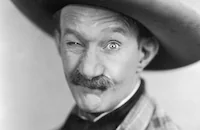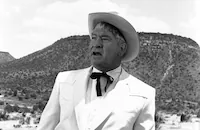Way Out West

Brief Synopsis
Cast & Crew
James W. Horne
Stan Laurel
Oliver Hardy
Sharon Lynne
James Finlayson
Rosina Lawrence
Film Details
Technical Specs

Synopsis
Stanley Laurel and Oliver Hardy are traveling to Brushwood Gulch, a small Western town, to deliver the deed of a valuable gold mine to Mary Roberts, the daughter of a deceased friend. They hitch a ride on a stagecoach, which also carries an attractive woman who catches Ollie's fancy. When they arrive, the woman complains to her husband, the sheriff, about Ollie's attentions, and he warns Ollie and Stan to be on the next stagecoach or else. After a little song and dance with some cowboys, the boys go to Mickey Finn's Palace for a drink, and Stan lets Finn in on their secret mission. Mary works for Finn as a kitchen drudge, but the boys have never met her, so Finn arranges for his wife, singer Lola Marcel, to impersonate Mary and steal the deed. Stan and Ollie give Lola the deed, as well as a locket belonging to Mary's father. As the boys are downstairs singing with the cowboys and having a drink for the road, Lola tricks the trusting Mary into signing the deed over to her. After the boys say their goodbyes, they accidentally meet Mary and discover their mistake. Stan and Ollie go back up to Lola's room to recover the deed, but after a long chase, Finn locks it in the safe. The sheriff then arrives and shoots at them as they run away. That night, they plan to steal the deed, and Ollie makes Stan eat his hat, as Stan did not fulfill his earlier promise to get the deed back after they first discovered the subterfuge. They sneak into town and, with the help of their mule "Dinah," loudly succeed in breaking into the saloon's kitchen, where Mary meets them. Their noise awakens Finn, who finds them hiding in the piano, but they manage to get his gun and make him retrieve the deed. After their escape, Stan, Ollie and Mary walk along the river, and Ollie and Mary discover that they are both from the South. Stan adds that he is from the south of London, and as the group sings about returning to Dixie, Ollie falls into a hole in the riverbed.

Director
James W. Horne
Cast

Stan Laurel

Oliver Hardy
Sharon Lynne

James Finlayson

Rosina Lawrence
Stanley Fields
Vivien Oakland

The Avalon Boys
Dinah
Mary Gordon
Tex Driscoll
Flora Finch
James Morton
Frank Mills
Dave Pepper
Crew
Felix Adler
Irving Berlin
Harry Black
Chet Brandenburg
Harry Carroll
Marvin Hatley
Marvin Hatley
J. Leubrie Hill
James W. Horne
Jack Jevne
Bert Jordan
Portia Lanning
Stan Laurel
Stan Laurel
Art Lloyd
Walter Lundin
Ballard Macdonald
Charles J. Morton
James Parrott
Elmer Raguse
William Randall
Hal Roach
Charles Rogers
Charles Rogers
Arthur I. Royce
Ted Schneider
Roy Seawright
W. L. Stevens
S. S. Van Keuren

Photo Collections
Videos
Movie Clip




Trailer
Hosted Intro
Film Details
Technical Specs

Award Nominations
Best Score
Articles
Way Out West
As the film opens, Stan and Ollie are riding a mule to the Old West town of Brushwood Gulch, where they plan to sign over a gold mine to the daughter (Rosina Lawrence) of their now-dead partner. After an uproarious gag in which they disappear into an apparently shallow puddle of water, they hitch a ride on a stagecoach. Unfortunately, they irritate one of the other passengers, who turns out to be the wife of the Sheriff of Brushwood Gulch. When she complains to her husband, he promptly kicks our heroes out of town.
This eventually leads to an assortment of shady characters trying to get their hands on the deed to the mine. But, more importantly, it gives Laurel and Hardy (who don't even don Western gear for their roles), the opportunity to dismantle the signifiers of movie Westerns. And they get to sing some songs and do a graceful soft-shoe in the process. It's all over in about an hour, although European prints were slightly longer in order for the picture to appear at the top of the bill (the duo were extremely popular overseas).
There's not much dialogue in Way Out West, a fact that Laurel explains in a telling, but humorously long-winded manner in the picture's press kit: "In preparing this original Western screenplay we determined on a plot to permit the elimination of as much talking as possible and at the same time not sacrifice story. In our characters we are dumber than usual and Hardy dominates to the point that every time I start to speak he stops me with one of those, 'That's all right, I know' sallies. It's not a question that 'I won't talk,' rather that we want to find out how the theater going public will take to our picture with less talk and more action."
Laurel and Hardy didn't receive the across-the-board respect they deserved for Way Out West. Though the reviews were positive for the most part, and a few were downright glowing, some critics simply refused to admit that the team's relatively lowbrow brand of humor worked like gangbusters. The showbiz journal, Variety, was particularly harsh, stating that the film "just about extinguishes the good results achieved in Our Relations (1936)." The review goes on to say that the "manner in which this comedy falters and stumbles along is probably due both to formula directing and scripting."
Well, it may have been a formula, but all great screen teams had their method. It was, in fact, expected of them. As the documentary filmmaker, Basil Wright, wrote of Way Out West, "there is no need to re-analyze (Laurel and Hardy's) particular characters, which every decent moviegoer knows as well as those of his own family." In this sort of comedy, it would seem, familiarity breeds laughs.
Laurel and Hardy, much like the Marx Brothers, would have to wait for their sometimes rickety pictures to withstand the test of time before they'd be truly accepted as comic geniuses. Though their movies often contained little banter, the fact that they still leave modern audiences in stitches speaks volumes about their gifts.
Producer: Stan Laurel, Hal Roach
Director: James W. Horne
Screenplay: Charles Rogers, James Parrott and Felix Adler (based on a story by Jack Jevne and Charles Rogers)
Cinematography: Art Lloyd and Walter Lundin
Editor: Bert Jordan
Music Composers: Marvin Hatley, Leroy Shield, Egbert Van Alstyne, J.L. Hill, Nathaniel Shilkret, Irving Berlin, Franz von Suppe
Art Design: Arthur I. Royce
Special Effects: Roy Seawright
Set Designer: William Stevens
Makeup: Jack Dawn
Cast: Stan Laurel and Oliver Hardy (Themselves), James Finlayson (Mickey Finn), Sharon Lynne (Lola Marcel), Stanley Fields (Sheriff), Rosina Lawrence (Mary Roberts), Jim Mason (Anxious Patron), James C. Morton (Bartender), Frank Mills (Bartender), Dave Pepper (Bartender), Vivien Oakland (Molly).
BW-65m.
by Paul Tatara

Way Out West
Quotes
Trivia
Notes
The working titles of this film were They Done It Wrong and Tonight's the Night, and a September 14, 1936 ad in Hollywood Reporter refers to Stan Laurel and Oliver Hardy's upcoming feature as In the Money. Modern sources state that You'd Be Surprised was another working title. According to a Hollywood Reporter news item, director James Horne worked on the film's script. Although Stanley "Tiny" Sandford is listed by Hollywood Reporter production charts as being in the cast, modern sources note that he was replaced in the role of the sheriff by Stanley Fields. M-G-M publicity sheets for the picture state that the river into which "Ollie" falls was man-made just above Sherwood Lake, about forty miles from Los Angeles. The film's music score, written by Marvin Hatley, received an Academy Award nomination for Best Music Scoring. According to a August 11, 1939 Hollywood Reporter news item, producer Hal Roach, M-G-M and Loews, Inc. were sued by Isabella Knotter, who claimed that Way Out West and Swiss Miss, were plagiarized from her book So zwei pechvogel. The outcome of the case has not been determined. Modern sources provide the following information about the production: Chill Wills, who was a member of The Avalon Boys, supplied the bass voice-over for Laurel during the "Trail of the Lonesome Pine" number, while actress Rosina Lawrence provided the soprano voice. The role of Mary Roberts was originally slated for Jacqueline Wells. Arthur Vernon Jones worked on the script, and Jack Dawn did the makeup. Modern sources also add the following actors to the cast: James Mason (Anxious patron); Harry Bernard (Man eating at bar); May Wallace (Cook); Jack Hill (Saloon worker); Sam Lufkin (Baggage man); Fred Toones (Janitor); Bobby Dunn, John Ince, Fritzi Brunette, Frank Montgomery, Bill Wolfe, Denver Dixon, Fred Cady Eddie Borden, Helen Holmes, Ben Corbett and Buffalo Bill, Jr. (Members of raucous audience), Cy Slocum (Member of raucous audience/Oliver Hardy's double), Lester Dorr (Cowboy extra); and Ham Kinsey (Stan Laurel's double). During the March 1992 Academy Awards telecast, in a salute to the 100th birthday of Hal Roach, a clip from the "At the Ball, That's All" dance number was shown, and through special effects, comedian Billy Crystal was seen dancing with Laurel and Hardy. For additional information on Laurel and Hardy's career together, please see entry above for Pardon Us.

Miscellaneous Notes
Released in United States 1937
Released in United States 1978
Released in United States 1978 (Shown at FILMEX: Los Angeles International Film Exposition (Special Programs - Bring the Kids) April 13 - May 7, 1978.)
Released in United States 1937















